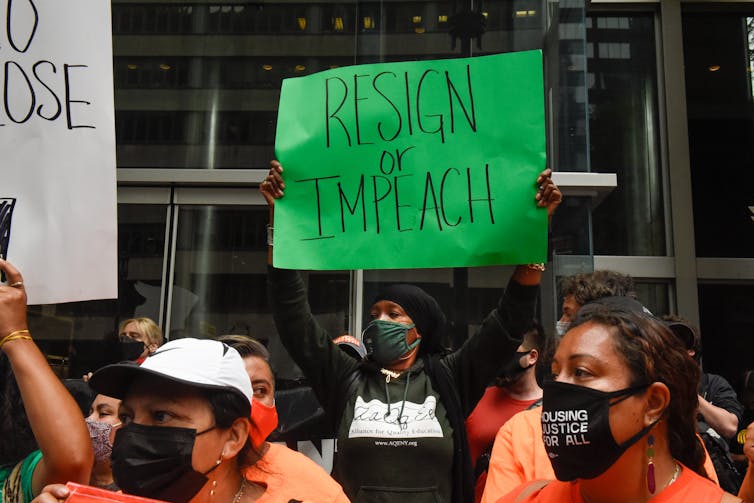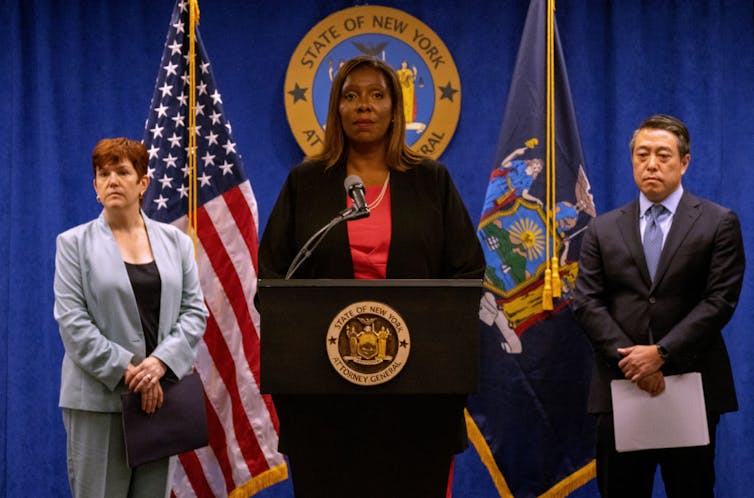Why Andrew Cuomo's job is more vulnerable to scandal than Donald Trump's was
- Written by Monika L. McDermott, Professor of Political Science, Fordham University
Riding high in politics frequently means you simply have further to fall – just ask sitting New York Gov. Andrew Cuomo.
Cuomo went from being talked about as a potential presidential candidate[1] in the spring of 2020 – thanks in large part to his handling of the COVID-19 pandemic in New York state[2] – to media ridicule and possible state senate impeachment[3] now, due to allegations of repeated sexual harassment occurring over several years.
According to the Quinnipiac University Poll[4], Cuomo’s job approval rating among registered voters in New York fell 44 percentage points between May 2020 and August 2021 – to just 28% in a newly released poll, his lowest recorded rating since taking office in 2011.
New York Attorney General Letitia James issued a report[5] on August 3, 2021 finding that Cuomo’s behavior runs afoul of state and federal definitions of sexual harassment. That likely bodes further erosion of his support and may provide the final blow.
Despite the loss of public approval, the pillorying by the press, and abandonment by most of his political allies[6], Cuomo is behaving as though he can hold onto his office, rejecting the charges and excusing his behavior by claiming he’s just a warm kind of guy[7]. He seems to be betting that he is personally stronger than this scandal, a ploy he may have learned from former President Donald Trump.
The nation watched in awe as Trump survived scandal after scandal, including those of a sexual nature[8], throughout his presidency and yet remained in office, seemingly untouchable.
With roughly 17 months left in office, the question is: Can Andrew Cuomo do the same?
 A protest against Cuomo outside his New York City office on Aug. 4, 2021.
Stephanie Keith/Getty Images[9]
A protest against Cuomo outside his New York City office on Aug. 4, 2021.
Stephanie Keith/Getty Images[9]
Trouble at home
Cuomo has been, and still is, following the overarching Trump playbook for dealing with scandal: if you simply deny having done anything wrong, eventually it will blow over.
As a scholar of public opinion and polling[10], I believe that Cuomo faces three big obstacles, however, that Trump did not face:
He is not Donald Trump, who had a cult of personality behind him that was virtually unshakeable;
The real force of the #MeToo movement[11] – the wave of allegations regarding sexual harassment and other forms of misconduct that brought down some powerful figures in fields like entertainment, news and politics[12] – only began in late 2017, after much of Trump’s, but before most of Cuomo’s, dirty laundry had aired; and
Cuomo is a Democratic officeholder, in a Democratic state, and as such is held to a higher standard by his constituency than Trump was when it comes to sexual harassment.
In other words, Cuomo is in a more vulnerable position, he is facing a public much more attuned to women’s harassment claims, and, most importantly, his constituency is naturally predisposed to judge him harshly on this issue.
Fallout on both sides
Being a Democrat, and therefore relying on Democrats as a base for support, is the most difficult obstacle for Cuomo to overcome.
According to a national December 2019 CBS News Poll[13], 89% of Democrats say sexual harassment and misconduct is a serious problem, including 49% who say the problem is very serious.
Compare this to the lower 64% of Republicans who say it is serious, including only 17% who view the problem as very serious (32 percentage points lower than Democrats).
This means that Cuomo’s problems are not just typical partisan problems. He is facing fallout not just from the opposing party, but on both sides of the aisle[14]. And for this particular behavior he is especially facing it on his own side[15].
This special feature of his Democratic constituency accounts for the dilemma Cuomo is currently facing trying to hold onto office amid public and political outcry over his actions.
Cuomo has never been an angel in the eyes of New Yorkers. In April 2020, Politico ran the following headline for a story about Cuomo’s fame during the pandemic: “I Just Hope This Thing Ends Soon So I Can Go Back to Hating Andrew Cuomo Again[16].”
But, Democrats are not forgiving him for the sexual harassment scandal, especially after years of learning how pervasive and destructive that kind of behavior is. According to a Marist Poll[17] conducted on the evening following Letitia James’ report release, a 52% majority of registered New York Democrats say Cuomo should resign from office. Only 41% of New York Democrats think he should serve out his term. Even non-white New York voters, a key Democratic constituency, favor Cuomo resigning by a six-percentage-point margin. While sometimes initial reactions can be tempered by time, if this drags out, which it appears likely to do, Cuomo is unlikely to recover his base.
 New York Attorney General Letitia James, with investigators Anne L. Clark and Joon H. Kim, present the findings of their sexual harassment probe into Cuomo, Aug. 3, 2021, in New York City.
David Dee Delgado/Getty Images[18]
New York Attorney General Letitia James, with investigators Anne L. Clark and Joon H. Kim, present the findings of their sexual harassment probe into Cuomo, Aug. 3, 2021, in New York City.
David Dee Delgado/Getty Images[18]
Wishful thinking vs. reality
How does Cuomo think he can soldier on in the face of losing his base of support? After all, it appears if he does not resign, the state assembly and Senate, along with the members of New York’s highest court, the Court of Appeals, who preside with the Senate as a High Court of Impeachment[19], will take matters into their own hands and impeach and convict him, thereby removing him from office.
With the Republican U.S. Senate, this was never a real threat for Trump – Republican constituents never lost their faith in Trump[20]. But if Cuomo is counting on the New York state legislature not to impeach and convict, he is not reading the poll numbers.
Having lost his public constituency, Cuomo has also lost support in the legislature. It is a law of politics that few sitting members would be willing to buck their own home constituents to defend a publicly unpopular executive.
Cuomo may, as many think Trump did, believe in his own mind that his behavior did not cross lines of unethical or illegal conduct, but the majority of New York voters and his former political allies now disagree with that.
[Get The Conversation’s most important politics headlines, in our Politics Weekly newsletter[21].]
References
- ^ potential presidential candidate (www.cnn.com)
- ^ his handling of the COVID-19 pandemic in New York state (www.cnn.com)
- ^ state senate impeachment (www.thecity.nyc)
- ^ Quinnipiac University Poll (poll.qu.edu)
- ^ issued a report (ag.ny.gov)
- ^ abandonment by most of his political allies (www.cnn.com)
- ^ rejecting the charges and excusing his behavior by claiming he’s just a warm kind of guy (apnews.com)
- ^ including those of a sexual nature (www.cnn.com)
- ^ Stephanie Keith/Getty Images (www.gettyimages.com)
- ^ As a scholar of public opinion and polling (scholar.google.com)
- ^ #MeToo movement (metoomvmt.org)
- ^ brought down some powerful figures in fields like entertainment, news and politics (www.nytimes.com)
- ^ CBS News Poll (www.cbsnews.com)
- ^ but on both sides of the aisle (maristpoll.marist.edu)
- ^ especially facing it on his own side (www.cnn.com)
- ^ I Just Hope This Thing Ends Soon So I Can Go Back to Hating Andrew Cuomo Again (www.politico.com)
- ^ Marist Poll (maristpoll.marist.edu)
- ^ David Dee Delgado/Getty Images (www.gettyimages.com)
- ^ who preside with the Senate as a High Court of Impeachment (www.politico.com)
- ^ Republican constituents never lost their faith in Trump (www.reuters.com)
- ^ Get The Conversation’s most important politics headlines, in our Politics Weekly newsletter (theconversation.com)
Authors: Monika L. McDermott, Professor of Political Science, Fordham University

